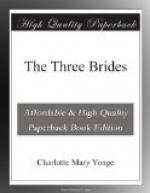“Oh, mother! mother! you know how little I am able,” said Miles, covering his face with his hands.
“You do not bring his burthened heart to the task,” she said. “If you had watched and felt with him, as perhaps only his mother could, you would know that I can be content that the long heartache should have ceased, where the weary are at rest. Yes, Miles, I feel as if I had put him to sleep after a long day of pain, as when he was a little child.”
They hardened themselves to the discussion, Mrs. Poynsett explaining what she thought the due of her eldest son, only that Cecil’s jointure would diminish the amount at her disposal. Indeed, when she was once aroused, she attended the most fully; but when Miles found her apologizing for only affording him the little house in the village, he cried out with consternation.
“My dear,” she said, “it is best so; I will not be a burthen on you young ones. I see the mistake.”
“I know,” stammered Miles, “my poor Anne is not up to your mark—not clever like you or Jenny—but I thought you did like her pretty handy ways.”
“I feel them and love them with all my heart; but I cannot have her happiness and yours sacrificed to me. Yes, you boys love the old nest; but even Julius and Rose rejoice in their own, and you must see what she really wishes, not what she thinks her duty. Take her out walking, you both need it badly enough.”
They ventured to comply, and eluding Mr. Charnock, went into the park, silvery with the unstanched dews, and the leaves floating down one by one like golden rain. “Not much like the Bush,” said Miles.
“No,” was all Anne durst say.
“Poor Nan, how dreary it must have looked to you last year!”
“I am afraid I wrote very complaining letters!”
“Not complaining, but a direful little effort at content, showing the more piteously, because involuntarily, what a mistake I had made.”
“No, no mistake. Indeed, Miles, it was not. Nothing else would have cured me of the dreadful uncharitableness which was the chief cause of my unhappiness, and if I had not been so forlorn, I should never have seen how good and patient your mother was with me. Yes, I mean it. I read over my old diary and saw how tiresome and presumptuous I was, and how wonderfully she bore with me, and so did Julius and Rosamond, while all the time I fancied them—no Christians.”
“Ah! you child! You know I would never have done it if I had known you were to be swamped among brides. At any rate, this poor old place doesn’t look so woefully dismal and hateful to you now.”
“It could not, where you are, and where I have so many to know and love.”
“You can bear the downfall of our Bush schemes?”
“Your duty is here now.”
“Are you grieved, little one?”
“I don’t know. I should like to have seen mamma; but she does not need me now as your mother does.”




